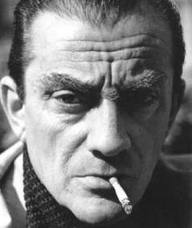|
|
| Visconti, Luchino
 |
Date of birth
2 November 1906, Milan, Lombardy, Italy
Date of death
17 March 1976, Rome, Italy
Mini biography
|
Director | Writer
Luchino Visconti
(Roma, 1906 - ca.,1977)
Of aristocratic birth, Visconti developed a passion for cinema in the '30s: during a stay in Paris, he met Jean Renoir and became his assistant.
His first experience as a director was with "Ossessione" (1942), which transposed the novel by James M. Cain "The Postman Always Rings Twice" to an Italian setting: bringing back to the big screen two actors of the Fascist regime - Clara Calamai and Massimo Girotti - whom he placed in unusual settings in stories permeated with sexuality, he created a watershed work that proved unpopular with the authorities, the expression of a new way of seeing cinema.
Arrested in '43 for his partisan activities, he was only to return to directing with "The earth trembles (La terra trema)" (1948), a liberal adaptation of "I Malavoglia" by Verga: with ordinary people in place of actors and filmed entirely in Sicilian dialect, the film is a family saga of powerful plasticity, in which a penchant for melodrama is combined with an aristocracy that although not populist, reveals a clearly Marxist influence.
And his vision of the people that filters through in the great "Bellissima" (1951), an articulo mortis celebration of neorealism and its ingenious surpassing, is Gramscian in the truest sense of the word: the product of the most diverse influences (Zavattini and "Cinema nuovo", Anna Magnani and Hollywood, the Cinecittà of Blasetti and the storyteller Chiari), it remains one of the most significant examples of Italian cinema, foreshadowing an anthropological change of which only very weak signals were being given off at that point, and was to find fertile soil for growth in the boom years, and in Pasolini its nostalgic, anguished bard.
Clearly in a state of grace, Visconti went on to make "Livia (Senso)" (1954) - a fresh interpretation of the Risorgimento free from mystifying hypocrisies and an unparalleled tribute to the world of Verdi - an undisputed work of art, in which the perfection of the staging (take the opening scene in the theatre or the rapid, febrile dénouement) goes hand in hand with impeccable directing of the actors.
Visconti's most fertile creative period concluded with "Rocco and his brothers (Rocco e i suoi fratelli)" (1960), epitome and summa of his art expressed in the form of a powerful melodramma which tells the story of the disintegration of a family of peasant origin brought into close contact with the city.
Mindful of Mann and Dostoevskij, the Milanese director suspends his tragic characters between Legend and History, placing them in a dimension that surpasses time and space and gives us unforgettable images (above all, the scene of the killing of Nadia, young Carmen, at the hydroport).
From here onwards, the undisputed mastery of the Milanese filmmaker was to descend to making films that were to varying degrees comedies of manners: nonetheless there were still some splendid achievements ("Il gattopardo", 1963, in which nostalgia of the past and ideological awareness successfully meet in what at least figuratively is an impeccable story) as well as unusual works (in '73, the nocturnal and ghost-like "Ludwig", swollen with rain and fright, streaked with mournful predictions of death), but his aesthetics-driven, bourgeois side - which was to earn him the biting title of "designer duke" - ended up prevailing.
Away from the contingent focus of political bickering, he returned to directing in favour of writing: commentator of the highest rank for a cultured and demanding public, alas increasingly distanced from the march of history.
F.T. |
|
Director - Selected filmography
-
Conversation Piece - Gruppo di famiglia in un interno (1974)
-
Death in Venice | Morte a Venezia (1971)
-
The Damned | La caduta degli dei | De Lange Knives Nat (1969)
-
The Witches | Le Streghe (1967)
-
Sandra - Vaghe stelle dell'Orsa (1965)
-
The Leopard | Il Gattopardo (1963)
-
Rocco and His Brothers | Rocco e i suoi fratelli (1960)
-
White Nights | Le notti bianche (1957)
-
Livia - Senso (1954)
-
Bellissima (1951)
-
The Earth Trembles | La Terra trema: Episodio del mare (1948)
-
Ossessione (1943)
|
|
|
| Choose an item to go there!
|
|

